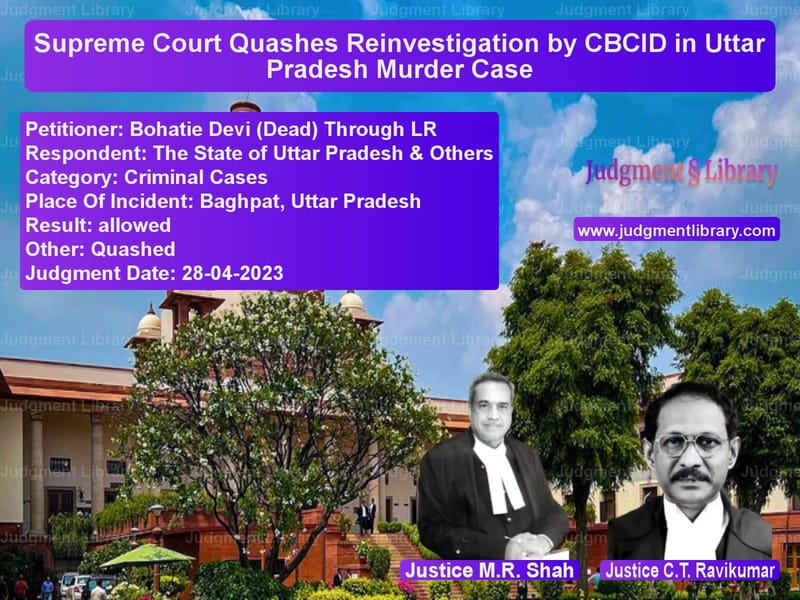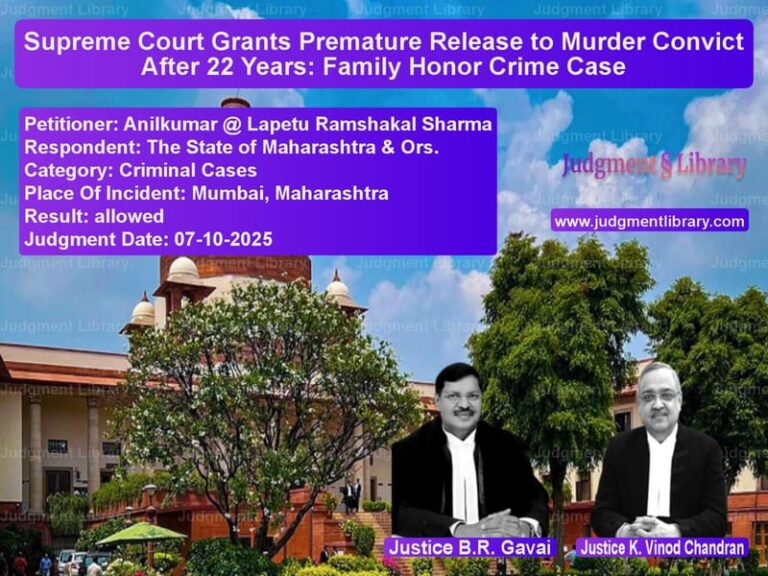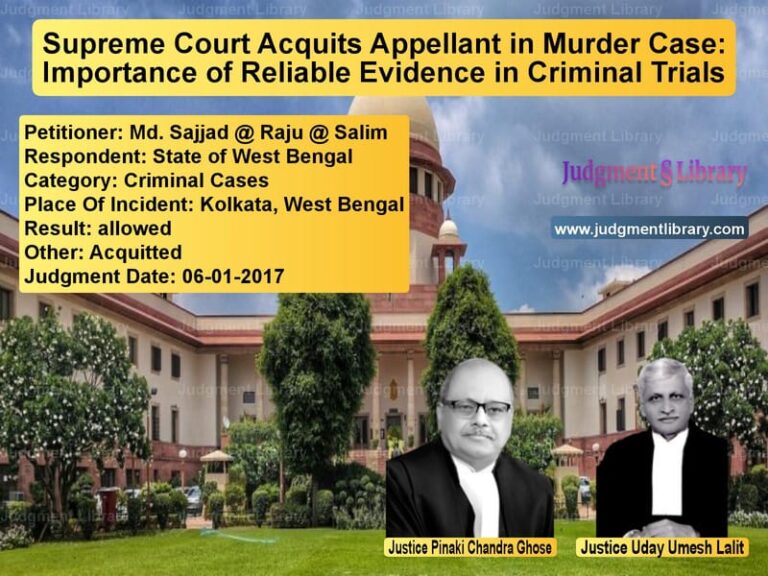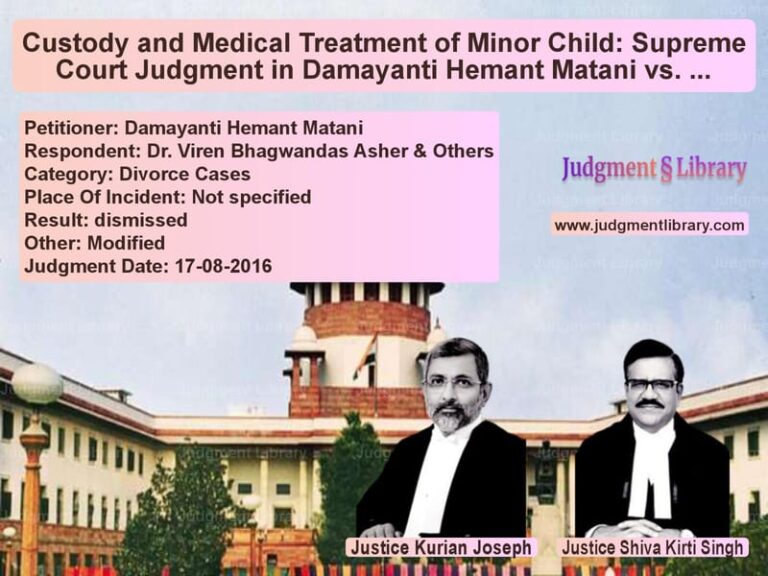Supreme Court Quashes Reinvestigation by CBCID in Uttar Pradesh Murder Case
The Supreme Court of India, in Bohatie Devi (Dead) Through LR v. The State of Uttar Pradesh & Others, delivered a significant judgment quashing the order of the Secretary (Home), Uttar Pradesh, which directed reinvestigation by the CBCID into a murder case. The ruling upholds the principle that once a chargesheet is filed and taken cognizance of by the magistrate, reinvestigation cannot be arbitrarily ordered at the request of an accused person’s family member.
Background of the Case
The case pertains to the murder of Satyaveer alias Kallu, the son of the appellant, whose murder was reported in Case Crime No. 1069/2014. The key events are as follows:
- 2014: An FIR was lodged by the victim’s brother-in-law, Sanjeev, against Smt. Anju and two unknown persons.
- 2015: Initial investigation led to a chargesheet against two persons.
- 2016: On further application by the victim’s mother, the investigation was transferred to the District Crime Branch, which filed a supplementary chargesheet against Ashwani Kumar (respondent No. 8) and Smt. Anju (respondent No. 11).
- 2017: Ashwani Kumar filed a petition to quash the chargesheet, which was dismissed by the Allahabad High Court.
- 2018: The Supreme Court also rejected Ashwani Kumar’s challenge, leading to the issuance of a non-bailable warrant against him.
- 2019: The mother of Ashwani Kumar applied to the Secretary (Home), Uttar Pradesh, requesting a reinvestigation by the CBCID.
- February 2019: The Secretary (Home) ordered reinvestigation by CBCID.
- 2023: The Allahabad High Court dismissed the victim’s mother’s challenge to the reinvestigation, leading to this appeal before the Supreme Court.
Petitioner’s Arguments
Senior Advocate Ms. Vibha Datta Makhija, representing the appellant, argued:
- Once a chargesheet has been filed and cognizance taken by the magistrate, the investigation cannot be reopened at the request of an accused person’s family.
- The reinvestigation order by the Secretary (Home) was beyond his jurisdiction and violated the CrPC.
- The accused had already exhausted their remedies by challenging the chargesheet before the High Court and Supreme Court and had failed in both attempts.
- Reinvestigation at this stage amounts to nullifying the earlier investigation and supplementary chargesheet, which is legally impermissible.
Respondent’s Arguments
The State of Uttar Pradesh and the accused countered:
- The accused are entitled to fair investigation, which includes the possibility of reinvestigation when new evidence arises.
- The CBCID was better equipped to conduct a fresh probe into the case.
- The order for reinvestigation was administrative and valid under Section 173(8) of CrPC, which permits further investigation.
Key Legal Issues Considered
- Can a Secretary (Home) order reinvestigation after a chargesheet has been filed and taken cognizance of by the magistrate?
- Was the reinvestigation order legally valid under Section 173(8) CrPC?
- Does an accused person’s mother have the right to seek reinvestigation?
Supreme Court’s Observations
The Supreme Court ruled in favor of the appellant, stating:
- “Once a chargesheet has been filed and taken cognizance of by the magistrate, further investigation must be approved by the competent court, not by an administrative officer.”
- “The order of the Secretary (Home) is arbitrary and unknown to law.”
- “The power of reinvestigation lies solely with the judiciary, not with executive authorities.”
- “Allowing this would create a dangerous precedent where accused persons could manipulate investigations through administrative channels.”
The Court referred to State of Andhra Pradesh v. A.S. Peter (2008) and Ram Lal Narang v. State (Delhi Administration) (1979), affirming that further investigation requires judicial oversight.
Final Judgment
The Supreme Court ruled:
“The appeal is allowed. The judgment of the Allahabad High Court is quashed. The order of the Secretary (Home) directing reinvestigation by CBCID is set aside.”
Impact of the Judgment
- Limits executive interference in criminal investigations – Ensures investigations remain under judicial oversight.
- Prevents abuse of legal loopholes – Accused persons cannot delay or nullify investigations through administrative orders.
- Protects victim rights – Ensures justice is not undermined by post-investigation interference.
Conclusion
The Supreme Court’s ruling in Bohatie Devi v. State of Uttar Pradesh reinforces that once a chargesheet is filed and taken cognizance of by the magistrate, reinvestigation cannot be ordered by executive officers. This judgment strengthens the separation of powers and ensures that investigations remain independent and judicially supervised.
Petitioner Name: Bohatie Devi (Dead) Through LR.Respondent Name: The State of Uttar Pradesh & Others.Judgment By: Justice M.R. Shah, Justice C.T. Ravikumar.Place Of Incident: Baghpat, Uttar Pradesh.Judgment Date: 28-04-2023.
Don’t miss out on the full details! Download the complete judgment in PDF format below and gain valuable insights instantly!
Download Judgment: bohatie-devi-(dead)-vs-the-state-of-uttar-p-supreme-court-of-india-judgment-dated-28-04-2023.pdf
Directly Download Judgment: Directly download this Judgment
See all petitions in Custodial Deaths and Police Misconduct
See all petitions in SC/ST Act Case
See all petitions in Fraud and Forgery
See all petitions in Judgment by Mukeshkumar Rasikbhai Shah
See all petitions in Judgment by C.T. Ravikumar
See all petitions in allowed
See all petitions in Quashed
See all petitions in supreme court of India judgments April 2023
See all petitions in 2023 judgments
See all posts in Criminal Cases Category
See all allowed petitions in Criminal Cases Category
See all Dismissed petitions in Criminal Cases Category
See all partially allowed petitions in Criminal Cases Category







